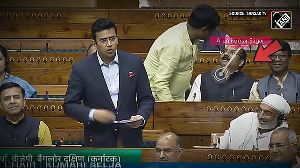A week after nine bombs killed 66 people in Jaipur, a team of Jaipur police is still verifying the antecedents of the people living at the Bagrana transit camp, about 10 km from the city.
The team has been calling the head of every household and getting details like place of birth, age, and the time they came to India and when they settled in Jaipur.
"Those who live here from the time the transit camp was set up were photographed and we have their records. Now, the government has asked us to identify the newcomers and report to it," Jeewan Ram Bishnoi, who was monitoring the process, said.
The police are also constantly calling in people for questioning.
"Apart from verifying their antecedents, we have also been asked to assist the blasts probe by checking if any outsider had come and stayed in the camp in the recent past,'' Bishnoi said.
This long-drawn verification process has thrown up a problem. The camp has some migrant workers from West Bengal, most of whom left their hometowns many years ago and settled in Jaipur to earn a living. These people say the police are harassing them, while the police say they have to be called in for questioning for lack of records.
If a person claims to be from West Bengal and has no records, the police say they will have to send his bio to the corresponding Bengal police district and wait for confirmation.
"I left my village in Bengal North 24 Pargana at a very young age. After traveling through various cities, I came and settled here in Jaipur 18 years ago. But I do not have any papers to prove my identity. I am a rag-picker. I collect plastic bags and live from what I make out of selling the bags. Even if the police go to my village now, who will know me there? How will anyone vouch for me? Now they are calling me to the police station for questioning," a 60-year-old said.
Indians like him are not the only ones who are miffed at the police action. Even Bangladeshis who had settled in Jaipur long ago are worried.
"They picked up my sister-in-law's husband. He has been here for close to 20 years and is kabadi-wala. Everyone knows him and he is not involved in any criminal activities, leave alone terrorism. The police took him two days ago and dropped him off in the night only to take him back the next morning. Ever since the blasts, we haven't gone out of the basti. His family is starving now," said Maqbool.
His sister-in-law Maleka added: "He was ill when they took him. My children haven't eaten anything for two days. There is no money. I don't know when they will let him off. He hasn't done anything."
The police, however, say nothing is in their hands. "We have been asked to do a job that involves verification and questioning. We keep calling these people for questioning and send them off. If the person has not done anything wrong, he does not have to fear anything. We will send them back," Bishnoi assured.
But, word has reached the basti that the Bangadeshis may be evicted and even deported.
Soon after the blasts, Rajasthan parliamentary affairs minister Rajendra Singh Rathore said illegal migrants would be identified in a month and evicted. Some Bangladeshis had obtained ration cards and other documents claiming to be from West Bengal and these people may even be deported.
"We came here to earn a livelihood and nothing more. When the government put us in this Bagrana transit camp, they gave us electricity and promised concrete houses. If they want to throw us out now, why did they do all this for us? They could have thrown us out then itself. Why promise something and take it away like this?" Mohmin Moosa, a 25-year-old Bangladeshi, said.





